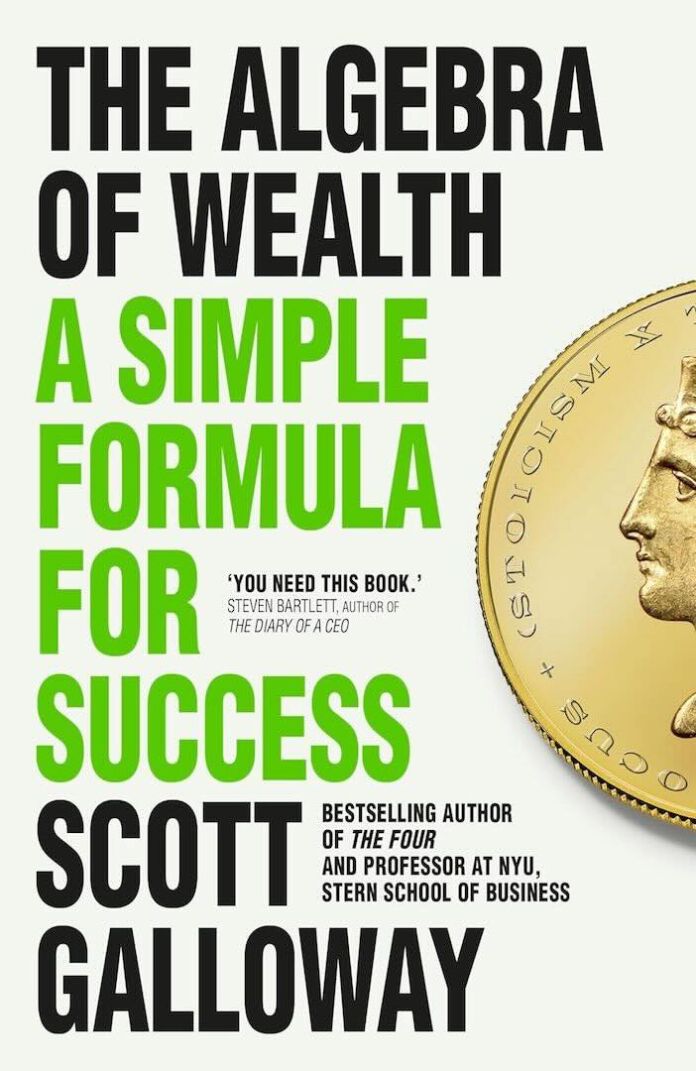In an age where economic anxiety permeates every aspect of our lives, Scott Galloway’s “The Algebra of Wealth” arrives as a timely compass for navigating the increasingly complex landscape of personal finance and wealth creation. Just as his previous works like “The Four” and “Post Corona” dissected the tech industry and pandemic-era economics, this book applies his characteristic analytical rigor and irreverent wisdom to the universal pursuit of financial security.
The Formula Unveiled
At its core, Galloway presents a deceptively simple equation for building wealth:
Focus + (Stoicism × Time × Diversification)
What makes this book stand out is not just the formula itself, but how Galloway unpacks each component with both theoretical depth and practical applicability. Unlike traditional personal finance books that often get bogged down in spreadsheets and technical jargon, “The Algebra of Wealth” approaches wealth-building as a holistic endeavor that encompasses behavior, career strategy, and investment principles.
Beyond the Numbers: A Human Approach to Wealth
Perhaps the book’s greatest strength lies in its recognition that wealth creation isn’t merely a mathematical exercise. Galloway weaves personal anecdotes throughout, from his early struggles with economic anxiety to his eventual success, making the abstract concepts tangible and relatable. His story about losing 70% of his net worth when his company Red Envelope declared bankruptcy serves as a powerful lesson in the importance of diversification.
The author’s vulnerability in sharing his failures alongside his successes lends authenticity to his advice. His discussion of the psychological aspects of wealth-building—from combating lifestyle creep to managing the emotional toll of investment losses—addresses challenges that many finance books overlook.
Critical Analysis
Strengths
- Practical Framework: The book’s organized structure around the wealth formula provides a clear roadmap for readers.
- Contemporary Relevance: Addresses modern challenges like the gig economy and changing retirement paradigms.
- Balanced Perspective: Combines technical knowledge with psychological insights.
- Engaging Writing: Galloway’s direct, often humorous style makes complex concepts accessible.
Areas for Improvement
- US-Centric View: The advice and examples primarily focus on the American context, limiting its global applicability.
- Privilege Blind Spots: Some recommendations assume a baseline level of financial stability that many readers may not have.
- Occasional Repetition: Certain concepts are reiterated more than necessary.
- Limited Coverage of Alternative Investments: The treatment of emerging asset classes like cryptocurrencies feels somewhat cursory.
Key Insights and Takeaways
Career Strategy
Rather than following passion, Galloway advocates following talent—a refreshingly pragmatic perspective in an era of “follow your dreams” platitudes. His analysis of various career paths, from entrepreneurship to academia, provides valuable insights for career planning.
Investment Philosophy
The book’s approach to investment is remarkably grounded. Galloway emphasizes the importance of:
- Long-term thinking
- Diversification across asset classes
- Understanding tax implications
- Avoiding day trading and market timing
Behavioral Economics
The incorporation of stoicism as a key component of wealth building sets this book apart. Galloway effectively demonstrates how emotional control and rational decision-making are crucial for financial success.
Comparative Context
While “The Algebra of Wealth” enters a crowded field of personal finance literature, it distinguishes itself through its integrated approach. Unlike pure investment guides like Benjamin Graham’s “The Intelligent Investor” or behavioral finance books like Morgan Housel’s “The Psychology of Money,” Galloway’s work bridges the gap between technical knowledge and practical implementation.
Target Audience and Applicability
The book is particularly valuable for:
- Young professionals starting their careers
- Mid-career individuals looking to optimize their wealth-building strategy
- Entrepreneurs seeking a balanced perspective on risk and reward
- Anyone struggling with the psychological aspects of money management
Writing Style and Accessibility
Galloway’s writing is characteristically direct and engaging. He balances academic rigor with street-smart wisdom, making complex concepts digestible without oversimplifying them. His use of personal anecdotes and contemporary examples helps readers connect with the material on both intellectual and emotional levels.
The Broader Impact
Beyond individual wealth creation, the book touches on important societal issues like income inequality, the changing nature of work, and the role of education in economic mobility. While these discussions could be deeper, they provide valuable context for personal financial decisions.
Final Verdict
“The Algebra of Wealth” successfully combines practical financial advice with psychological insights and career guidance, all while maintaining engagement through Galloway’s distinctive voice. While not perfect, it offers a comprehensive framework for building wealth that acknowledges both the mathematical and human elements of financial success.
The book’s greatest achievement is perhaps its ability to make wealth-building feel both ambitious and attainable. It doesn’t promise get-rich-quick schemes or magical solutions, but rather lays out a clear, actionable path to financial security through disciplined application of its core principles.
Whether you’re just starting your financial journey or looking to optimize your existing strategy, “The Algebra of Wealth” provides valuable insights and practical tools for navigating the modern economic landscape. It’s a worthy addition to the financial literature canon, offering a fresh perspective on the timeless pursuit of economic security.





